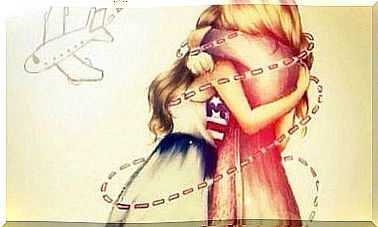The Advantages Of Empathic Communication

Communicating effectively is not that easy. Much more often, assumptions and misunderstandings emerge than clear messages and definitions. For this reason, Marshall B. Rosenberg developed empathic communication, also known as nonviolent communication.
This tool was developed with the intention of giving us the necessary skills to connect with others in an appropriate manner and in accordance with our values. In addition, it not only avoids conflict, but also allows us to resolve existing problems in a rational way by distancing ourselves from more traditional forms of communication. Through empathic communication, we can actively listen to each other, based on mutual understanding.
An assertive personality
Assertiveness can be classified between passivity and aggressiveness. It is a skill that allows us to express personal opinions, respect others, and set boundaries. The psychologist Rosenberg encouraged us to put this into practice to improve our relationships.

One of the most common traits of assertive people is their understanding of the weaknesses of others. That is, they do not criticize their fellow human beings, do not neglect them and do not feel indifference for them, but take them as they are, try to understand them. Assertiveness is therefore a main aspect of empathic or non-violent communication.
Whoever asserts himself respects the limits, needs, wishes and opinions of others.
What are the advantages of empathic communication?
Empathy – the ability to put yourself in the other person’s shoes – is an essential part of this type of communication alongside verbal and non-verbal language. Nonviolent communication aims to establish an authentic connection between the sender and the recipient. Therefore, empathic communication has the following advantages:
Satisfactory personal relationships
Empathic communication relies on clear and unambiguous expression that leads to better understanding. At the same time, this leaves less room for criticism and results in a more effective exchange of easily understandable messages.
If we share our fears with our counterpart in a self-asserting way , we give them the opportunity to understand us and our discomfort. Rosenberg particularly emphasized how important it is to let the other know that the expectations shared by both have not been fulfilled.
Conflict resolution
The key to empathic communication that works is to talk about your feelings in the first person. So nobody can argue about what is being communicated, because that is a very individual piece of information that belongs to the person who expresses it. So if we do not want our message to be interpreted as an attack, but as an attempt at non-violent communication, we should begin our sentences with “I have the feeling that …” or “I feel …” .
Instead of saying, “We met an hour ago. You are always late! ” , We should say “ If you let me wait that long, I will lose my desire to meet you. It’s annoying, bothers me and makes me feel like I’m “powerless” to try. If, instead of blaming and expressing criticism, we say how we feel, communication becomes less negatively charged. Our interlocutor will not feel offended, we can express ourselves and come to a solution.
sincerity
We have to be able to say “no” and be able to accept our counterpart’s “no” . This is the only way we can remain respectful of ourselves and others. In addition, to be sincere, we must eliminate all kinds of speculation from our communications.
According to Bob Wentworth, an expert on nonviolent communication, our impression is based on an observation, our feelings underpin it and distance us from our rational point of view. Our needs would strengthen the connection to the other person and reveal what is important. In addition, a request should clarify what kind of reaction we would like. When we use these components together, there is no room for moral judgments, as we can then also see.

Developing the ability to listen and understand
Nonviolent communication promotes the development of empathic ability towards ourselves. This is understood as a compassionate way of realizing what is happening inside us. To do this, we need to become aware of our feelings, thoughts and judgments and connect to the needs that paralyze or block us.
This type of communication also promotes empathy as the ability to understand how another person feels. This enables us to understand not only his thoughts and goals, but also his sensations and feelings.
Behaviors that prevent empathic communication
Rosenberg assured that there are many advantages to cultivating empathic communication, but that there are also certain modes of communication that would block the development of this type of communication and thus empathy and assertiveness.
Playing the moral apostle
Whoever plays the moral apostle does not convey what he really feels, but rather hides his feelings. As a result, they take on a different form, namely that of criticism, humiliation, insults or cynicism. Rosenberg suggested that we replace these with objective observations and avoid making any judgment as to it, in order to focus on what we are actually feeling.
“The report you sent me is a disaster. So we can’t give it to anyone ” , for example, we can replace it with “ In the report you sent me there are some points that we have to work on again before we give the report to the customer ” .
Claims and comparisons with other people
Requests, demands, insults, etc. – we resort to all possible means to force the other to understand each other. Ultimately, however, these are threats that trigger feelings of guilt or act like a punishment if our demands are not met. There are also ways of manipulating someone, and that stands for aggressive communication.

Avoid responsibility
A typical example of this behavior is when a youngster comes home with his grades and says, “Mom, you failed me.” The passive formulation stands for blaming someone else for their misfortune and taking responsibility for them to press.
Something similar happens every day when we use impersonal language or conditional clauses and thus refer to our history or experiences. This is about not wanting to take on the consequences for your own actions.
As we can see, both interlocutors have to make an effort for empathic communication, but the resulting advantages are worth the effort.









